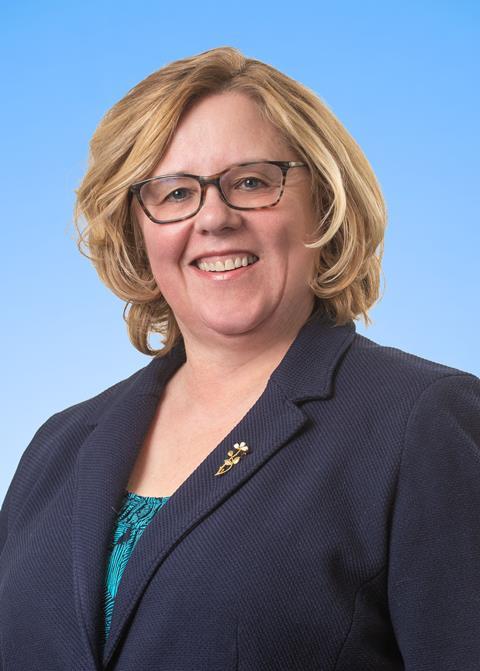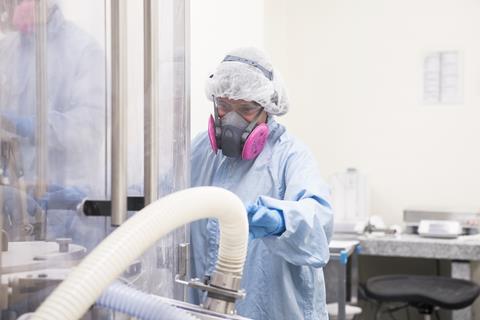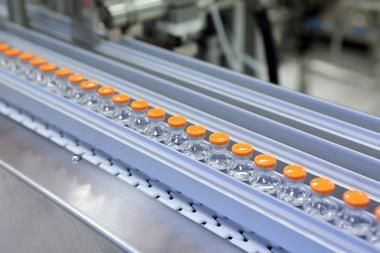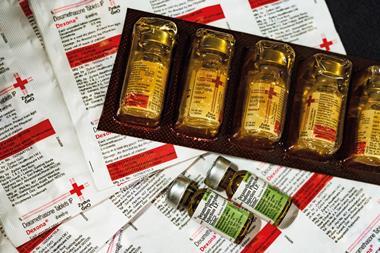Catalent is adapting, focusing on employee safety and supply chain security

‘Things at Catalent certainly have changed over the last few months,’ says Kay Schmidt, senior vice president of technical operations at the multinational company headquartered in New Jersey, US. The contract development and manufacturing organisation has over 40 sites across the world and around 13,500 employees. Of those, Schmidt included, about 25% are working remotely due to the pandemic. The rest need access to labs and manufacturing plants, and Catalent, like many similar firms, needed to find ways for that to happen safely.
After Covid-19 infections and deaths mounted in China – and Wuhan and other cities were locked down – Catalent mobilised a crisis management team on 30 January.
I spend all my waking hours thinking about the health and safety of our workers
‘We instituted our business continuity plan, and it’s evolved over time,’ explains Schmidt. Initially, the assumption was that the epidemic mostly posed a potential supply chain disruption, but it soon became clear that the ramifications were much greater.
‘Our primary focus is to keep our employees healthy and safe so that we can continue to maintain operational continuity across all of our sites, allowing us to get our patients and our customers critical medications,’ says Schmidt. ‘I spend all my waking hours thinking about the health and safety of our workers,’ she tells Chemistry World.
One of the first changes was to send home all employees who could work remotely in February. ‘To enable that, our IT system had to step up. We switched to Zoom and other remote working tools,’ Schmidt recalls.
Chemists at Catalent test incoming raw materials or finished product for customers, and they also work to develop protocols, tests and other methods to enable product delivery. These workers are typically tied to equipment and products in the lab, but can do some of their work remotely. ‘Of course, if they have to do an analysis and they need the equipment and the ingredients then they are in the factory,’ she adds. ‘But, if they can design and write a future test, for example, they might be at home doing that.’
24/7 and staggered starts
The company has implemented significant changes for the roughly 75% of its workers who remain in-plant, including switching to 24/7 operation in shifts at several of its facilities, and changing shift starts to minimise congregation. ‘If they had one shift they may have gone to two or more, or they might have staggered shift starts,’ Schmidt says.
We are going to change the way we work, we are going to be, I hope, kinder and gentler to each other and have empathy about work-life balance
Catalent has also implemented visual cues, for example tape markers on floors to indicate appropriate personal space, coupled with social distancing guidelines. In areas where social distancing is difficult, such as labs and production areas, facemasks are required. There is also a lot more cleaning and housekeeping.
‘If you are a chemist and you are working on…first shift, the expectation is that you are going to clean the workstation when you depart, and then I am going to clean it again when I arrive,’ Schmidt says. The goal is to keep potential viral contamination down as much as possible.

One of the company’s major areas of focus is its supply chain, having increased its order quantities for active pharmaceutical ingredients, excipients and packing components by three to six months. ‘You are buying more so you have a buffer,’ Schmidt explains.
The company has over 30 active programmes, whose schedules need to be shortened dramatically as manufacturing must continue, while the demand for new projects relating to Covid-19 therapies and vaccines continues to grow.
Like most of the world, we have “confirmed positive” and “presumed positive”, and we treat those two populations exactly the same
‘We have collapsed timelines four or fivefold,’ Schmidt says. ‘Making a first clinical batch might have taken us four months previously, now we are expected to get the raw materials in, test them, design the protocols to manufacture and then test the drug, all in less than month.’
Schmidt says Catalent is ‘very actively hiring chemists’ in a lot of its Covid-19-related businesses and for current production. The company is heavily involved in developing potential treatments and vaccines for Covid-19. ‘That’s a big change,’ Schmidt says.
Meanwhile, new strict visitor controls are posing some challenges. Historically, Catalent customers have been able to come to plants and observe work there to develop their products, but that has changed. The company is now using technology like Google Glass to let partners observe operations remotely.
When infection strikes
Catalent has encountered Covid-19 infections, though the company won’t say how many. When a worker tests positive, the company traces their contacts to determine who might have been exposed. Risk assessments based on duration of contact, whether social distancing protocols were followed, and if there was any bioexposure, for example through shared equipment determine whether contacts are sent home to isolate, asked to self-monitor for symptoms, or told to see their doctor.
‘We don’t test people or tell people to get tested,’ Schmidt says. ‘Testing is not ubiquitous,’ she adds, noting, for example, that it is common in some parts of the US but not available yet in other areas of the country, and that testing is ‘very uncommon’ in the UK.
‘Like most of the world, we have “confirmed positive” and “presumed positive”, and we treat those two populations exactly the same,’ she says. ‘We do contact tracing and make a decision.’
Schmidt suggests that measures like social distancing and contact tracing could be dialled back once there’s an effective vaccine for Covid-19, but manufacturing will likely be changed forever. ‘We are all going to keep our stock levels higher probably, because we have seen what a potential disruption can do,’ she predicts.
In addition, Schmidt says the pandemic has proven that even chemists don’t have to be in the plant all the time. ‘If you are doing something that requires a lot of thought and maths, maybe you’re better off at home [to avoid distractions from colleagues],’ she says. ‘We are going to change the way we work, we are going to be, I hope, kinder and gentler to each other and have empathy about work-life balance.’
Yet, there will be ever more pressure to produce even faster. ‘Reasonable risk, of course, but we have demonstrated many things we thought weren’t possible before are possible today – vaccines and treatments are moving along at unprecedented speed,’ Schmidt says.

















No comments yet